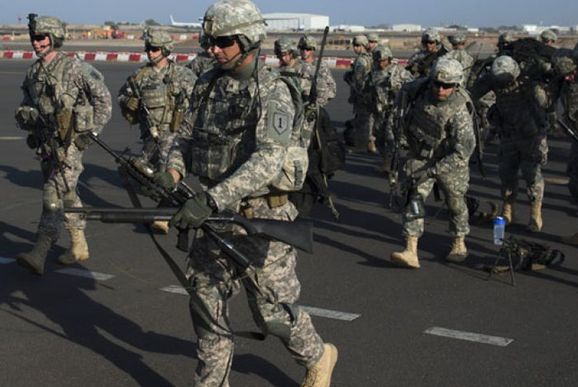America's secret military
- By Zhao Jinglun
 0 Comment(s)
0 Comment(s) Print
Print E-mail China.org.cn, January 24, 2014
E-mail China.org.cn, January 24, 2014
Former U.S. Defense Secretary Bob Gates famously remarked that any future defense secretary who advised the president to send a big American land army into Asia or into the Middle East or Africa should "have his head examined."
|
|
|
U.S. Army soldiers of the East Africa Response Force (EARF), prepare to load onto a U.S. Air Force C-130 Hercules at Camp Lemonnier, Djibouti. |
Americans have learned a bitter lesson from the disastrous Afghan and Iraq wars. While Washington is reluctant to commit to a big land army, it has not relaxed, instead it has intensified its war on terror and military interventions all over the world.
Instead of committing a big land army, it has stepped up drone attacks and special operations forces raids.
The first targeted assassination by an unmanned aerial vehicle based in Djibouti took place on Nov. 3, 2002, when the Special Ops signals intelligence team inside Yemen located Abu Ali al Harithi, a mastermind of the 2000 USS Cole bombing. A predator was launched which fired a Hellfire missile that killed both Harithi and Ahmed Hijazi, a U.S. citizen born in Buffalo, New York, who had been named as an unindicted co-conspirator in the alleged plot of six Yemeni Americans to provide material support to al Qaeda.
The targeted assassination of a U.S. citizen away from the declared battlefield of Afghanistan sparked outrage from civil liberties and human rights groups. But instead of issuing a statement that Washington will not sanction extra-judicial executions in any circumstances, the then National Security Advisor Condoleezza Rice declared on Fox News: "The president has given broad authority to U.S. officials in a variety of circumstances to do what they need to do to protect the country. We're in a new kind of war, and we've made very clear that it is important that this new kind of war be fought on different battlefields."
So George W. Bush brazenly violated the U.S. Constitution in the name of fighting a "new kind of war."
It is well known that the CIA facilitated the killing of Patrice Lumumba of the Congo, plotted the coup that killed Ngo Dinh Diem of South Vietnam, and the coup that killed Allende of Chile, and tried to assassinate Fidel Castro of Cuba on at least eight occasions without success.
The spate of assassinations had become so out of control that President Ford issued an Executive Order in 1976, explicitly banning the United States from "political assassinations." President Carter amended that ban to make it more sweeping: "No person employed by or acting on behalf of the United States government shall engage in, or conspire to engage in, assassination."






